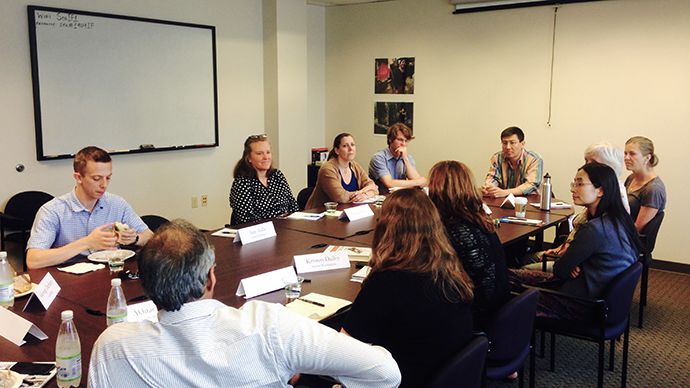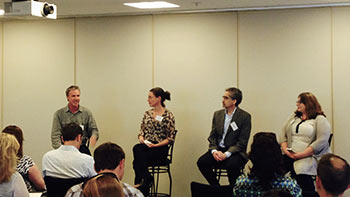Blog
Posted on June 25, 2015
By Kaitlin Marshall
 On June 24, Global Washington members gathered to meet Kentaro Toyama and discuss his new book, Geek Heresy: Rescuing Social Change from the Cult of Technology. An award-winning computer scientist and co-founder of Microsoft Research India, Toyama spent more than a decade designing technologies meant to address education, health and global poverty before coming to a radical conclusion. “Even in an age of amazing technology, social progress depends on human changes that gadgets can’t deliver,” says Toyama. This conclusion is the crux of his book, in which he argues that technology is not the solution to society’s greatest ills.
On June 24, Global Washington members gathered to meet Kentaro Toyama and discuss his new book, Geek Heresy: Rescuing Social Change from the Cult of Technology. An award-winning computer scientist and co-founder of Microsoft Research India, Toyama spent more than a decade designing technologies meant to address education, health and global poverty before coming to a radical conclusion. “Even in an age of amazing technology, social progress depends on human changes that gadgets can’t deliver,” says Toyama. This conclusion is the crux of his book, in which he argues that technology is not the solution to society’s greatest ills.
Continue Reading
Posted on June 15, 2015
By Lev Klarnet
 On June 9th, Global Washington hosted a panel discussion on the use of innovative technologies by social entrepreneurs. Panelists included: Ali Arjomand, Director of Analysis and Evaluation at Global Good; Beth Kolko, co-founder and CEO of Shift Labs; and Laura McLaughlin, Director of MSR Global Health. The discussion was moderated by Chris Coward, Principal Research Scientist and Director of the Technology & Social Change Group (TASCHA) at the University of Washington Information School. Humanosphere sponsored the event.
On June 9th, Global Washington hosted a panel discussion on the use of innovative technologies by social entrepreneurs. Panelists included: Ali Arjomand, Director of Analysis and Evaluation at Global Good; Beth Kolko, co-founder and CEO of Shift Labs; and Laura McLaughlin, Director of MSR Global Health. The discussion was moderated by Chris Coward, Principal Research Scientist and Director of the Technology & Social Change Group (TASCHA) at the University of Washington Information School. Humanosphere sponsored the event.
Continue Reading
Posted on June 8, 2015
 Do you know someone doing great work connecting the Seattle area to the rest of the world?
Do you know someone doing great work connecting the Seattle area to the rest of the world?
Someone whose tireless efforts embody the values of the Seattle Globalist: creativity, diversity, open-mindedness, social & economic justice, humanitarianism and community development?
Help choose the 2015 Globalist of the Year by nominating a changemaker in your community. It’s as simple as filling out this quick nomination form: http://bit.ly/nominategoty
The winner will be honored at the Globie Awards, on September 26th at Club Sur. Click here to buy tickets for the party: http://bit.ly/globies15tix
 On June 24, Global Washington members gathered to meet Kentaro Toyama and discuss his new book, Geek Heresy: Rescuing Social Change from the Cult of Technology. An award-winning computer scientist and co-founder of Microsoft Research India, Toyama spent more than a decade designing technologies meant to address education, health and global poverty before coming to a radical conclusion. “Even in an age of amazing technology, social progress depends on human changes that gadgets can’t deliver,” says Toyama. This conclusion is the crux of his book, in which he argues that technology is not the solution to society’s greatest ills.
On June 24, Global Washington members gathered to meet Kentaro Toyama and discuss his new book, Geek Heresy: Rescuing Social Change from the Cult of Technology. An award-winning computer scientist and co-founder of Microsoft Research India, Toyama spent more than a decade designing technologies meant to address education, health and global poverty before coming to a radical conclusion. “Even in an age of amazing technology, social progress depends on human changes that gadgets can’t deliver,” says Toyama. This conclusion is the crux of his book, in which he argues that technology is not the solution to society’s greatest ills. On June 9th, Global Washington hosted a panel discussion on the use of innovative technologies by social entrepreneurs. Panelists included: Ali Arjomand, Director of Analysis and Evaluation at Global Good; Beth Kolko, co-founder and CEO of Shift Labs; and Laura McLaughlin, Director of MSR Global Health. The discussion was moderated by Chris Coward, Principal Research Scientist and Director of the Technology & Social Change Group (TASCHA) at the University of Washington Information School. Humanosphere sponsored the event.
On June 9th, Global Washington hosted a panel discussion on the use of innovative technologies by social entrepreneurs. Panelists included: Ali Arjomand, Director of Analysis and Evaluation at Global Good; Beth Kolko, co-founder and CEO of Shift Labs; and Laura McLaughlin, Director of MSR Global Health. The discussion was moderated by Chris Coward, Principal Research Scientist and Director of the Technology & Social Change Group (TASCHA) at the University of Washington Information School. Humanosphere sponsored the event. Do you know someone doing great work connecting the Seattle area to the rest of the world?
Do you know someone doing great work connecting the Seattle area to the rest of the world?